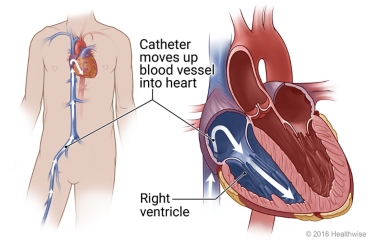Leadless Pacemaker Placement: What to Expect at Home
Your Recovery

A leadless pacemaker is a small, battery-powered device. It sends
mild, painless electrical signals to your heart. This keeps it
beating normally. Your doctor used a catheter to place the pacemaker
inside your heart.
Your groin may have a bruise and feel sore for a few days. You can
do light activities around the house. But don't do anything
strenuous for several days.
You'll need to take steps to safely use electric devices. Some of
these devices can stop your pacemaker from working right for a short
time. Check with your doctor about what to avoid and what to keep a
short distance away from your pacemaker. For example, you will need
to stay away from things with strong magnetic and electrical fields.
An example is an electronic body fat scale. You can use a cell phone
and other wireless devices, but keep them at least 6 inches away
from your chest. Many household and office electronics don't affect
a pacemaker.
This care sheet gives you a general idea about how long it will take
for you to recover. But each person recovers at a different pace.
Follow the steps below to get better as quickly as possible.
How can you care for yourself at home?

Activity
|
|
|
|
|
-
Do not do strenuous exercise and do not lift, pull, or
push anything heavy until your doctor says it is okay.
This may be for several days. You can walk around the
house and do light activity, such as cooking.
|
|
|
|

Diet
|
|
-
If you had dye injected, drink plenty of fluids to help
your body flush out the dye. If you have kidney, heart, or
liver disease and have to limit fluids, talk with your
doctor before you increase the amount of fluids you drink.
|

Medicines

Care of
the catheter site

Other
instructions
|
|
|
|
|
|
|
|
-
Tell all of your doctors, dentists, and other health
professionals that you have a pacemaker before you have
any test, procedure, or surgery.
|
|
|
|
|
|
|
|
|
|
Follow-up care is a key part of your treatment and safety. Be
sure to make and go to all appointments, and call your doctor if you
are having problems. It's also a good idea to know your test results
and keep a list of the medicines you take.
When should you call for help?
 Call 911 anytime you think you may need emergency care.
For example, call if:
Call 911 anytime you think you may need emergency care.
For example, call if:
Call your doctor now or seek immediate medical care if:
Watch closely for changes in your health, and be sure to contact
your doctor if you have problems.
Current as of: June 24, 2023
Content Version: 14.0
Care instructions adapted under license by your healthcare professional. If you have questions about a medical condition or this instruction, always ask your healthcare professional. Healthwise, Incorporated disclaims any warranty or liability for your use of this information.